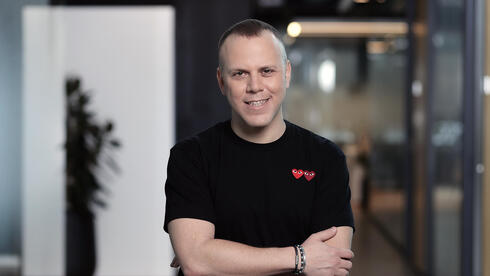
HR in the AI era
Amdocs: “We view AI tools not as a replacement for human talent, but as a powerful enabler”
According to its Head of HR Israel, Amdocs’ approach to adopting AI is to augment and empower its workforce, while remaining mindful of the potential security threats new technologies pose.
“Maintaining the security of both our employees' and clients' data is paramount. This necessitates a highly cautious approach to implementing any new technologies,” explained Inbar Mark, Head of HR Israel at Amdocs. “We simply cannot adopt every new solution that emerges.”
CTech’s "HR in the AI Era" series explores how the AI revolution is impacting the workforce across Israeli high-tech companies. In this series, we uncover the effects (both personal and professional) that this technology shift has had on Startup Nation.
“Our focus has been on leveraging AI as a powerful tool to augment and empower our workforce,” Marks continued. “We view AI tools not as a replacement for human talent, but as a powerful enabler that enhances our capabilities across the board.”
You can read the entire interview below.
Company name: Amdocs
Your name and title: Inbar Mark, Head of HR Israel
Names of founders and upper management: Founders: Boaz Dotan and Morris Kahn
Upper Management: Shuky Sheffer (Global CEO) and Avishai Sharlin (Israel CEO)
Year of founding: 1982
Investment stage: Public Company
Total investment to date: N/A
Field of activity: AI, Telecommunication
Number of employees: Approximately 4000
Office location: Ra'anana, Sderot and Nazareth
Number of open positions: Over 70 open positions, as well as special recruiting programs.
On a scale of 1-10, how much does the AI revolution disrupt your company operation in general, and the HR department specifically?
6
At Amdocs, innovation is at the core of everything we do, and this includes our strategic adoption of AI. We view AI tools not as a replacement for human talent, but as a powerful enabler that enhances our capabilities across the board.
What interesting AI tools do you and your staff use in employee management/recruitment?
We implemented Eightfold Talent Acquisition Hub, which uses AI to not only source but also streamline the entire recruitment process – from checking job descriptions for bias, to improving them to make them more attractive, and screening CVs based on our requirements (skills, education, experience etc.). It assigns match scores and highlights top candidates. It schedules interviews etc. This enables our recruiters and sources to focus more on the candidate and hiring manager experience.
We have also implemented Eightfold Career Hub for managing Internal Mobility which is a very big part of our strategy. The Career Hub, being skill-based, enables employees to find roles that they traditionally might not have even looked at based on the job title alone. As the AI looks at skills, it offers all types of opportunities based on the employee’s skills and motivations, aspirations, and potential. The Hub also uses AI to suggest learning opportunities based, again, on the employee's skills and aspirations.
Besides implementing the MS Co Pilot Enterprise throughout the company, we developed our own agent Ping, where employees can ask about everything in the HR arena that is documented in simple, natural language, helping employees navigate through complex policies etc. ranging from our vacation without limits policies to reporting the birth of a child.
In which roles or tasks within your company has AI already begun to replace human labor (if at all)?
We haven't seen AI directly replace human labor in specific roles or tasks within our company. Instead, our focus has been on leveraging AI as a powerful tool to augment and empower our workforce. AI is primarily used to automate repetitive processes, analyze vast amounts of data, and provide insights that help our teams make more informed decisions and work more efficiently. This allows our employees to dedicate their time to more complex, creative, and strategic initiatives, ultimately enhancing their capabilities, rather than replacing them.
What are the two major challenges you are coping with these days?
With the rapid development of new tools, maintaining the security of both our employees' and clients' data is paramount.
This necessitates a highly cautious approach to implementing any new technologies. We simply cannot adopt every new solution that emerges; our priority is always to ensure the highest level of data protection.
Have you experienced workforce-related challenges due to the war, and are you still feeling the impact of the security situation on your human resources?
We have certainly experienced workforce-related challenges due to the war, and we continue to feel the impact of the security situation on our human resources.
Our primary focus has been on supporting employees who were, and some who still are, drafted for military service. This population remains a key priority, and we've equipped their managers, both in Israel and in our global regions, with the necessary guidance to effectively manage these circumstances. We fully recognize the complexities involved in returning to work after military service, and we've implemented a comprehensive re-boarding process that trains managers to ensure a respectful, sensitive, and supportive transition back into the workplace for these individuals.
Have you made changes to your workforce following the increased use of AI tools, both in terms of headcount and internal shifts between departments?
At Amdocs, innovation is at the core of everything we do, and this includes our strategic adoption of AI. We view AI tools not as a replacement for human talent, but as a powerful enabler that enhances our capabilities across the board. Our ongoing investment in AI is primarily focused on augmenting our teams, allowing them to tackle more complex challenges, gain deeper insights, and drive greater efficiency.
As a dynamic global company, we are continuously evolving our workforce structure to align with strategic priorities and technological advancements. While we're always looking for ways to optimize our operations and deliver maximum value to our clients, any shifts in headcount or talent allocation are a natural part of our continuous adaptation to market demands and the opportunities presented by cutting-edge technologies like AI. Our commitment remains to fostering a highly skilled and agile workforce ready for the future.
How does the global market uncertainty affect your workforce, in terms of employee numbers or departmental reallocations? Are you scaling your workforce up or down in different regions around the world?
Even in a year full of challenges for Israel – war, social tensions, and uncertainty – Amdocs' global advantage truly shone.
Beyond ensuring business continuity, we built a truly global community: one that transcends borders, ethnicities, religions, and opinions. This is a community that cares for its people – just as we previously supported employees in the Philippines and other disaster-stricken areas, they supported us this year.
Teams worldwide stepped up, taking on tasks from their colleagues in Israel, enabling them to cope with the complex reality. This is cooperation based on mutual responsibility, empathy, and solidarity. A strong brand isn't just tested on a business level; it's also tested on a human level, especially during times of crisis.
Do you estimate that in 2025–2026 you will increase or decrease the number of personnel?
At Amdocs, our approach to workforce planning is dynamic and forward-looking, constantly adapting to the evolving global market landscape and the specific needs of our clients. We remain optimistic about our strategic growth trajectory and our ability to capture new opportunities.
Our focus for 2025–2026 will continue to be on optimizing our talent base to ensure we have the right skills in the right places to support our long-term business objectives. This means we'll be heavily investing in talent development and upskilling our existing employees, while also strategically recruiting for critical roles that align with emerging technologies and market demands.














